
Water Biology and Security
Scope & Guideline
Exploring the depths of water science and security.
Introduction
Aims and Scopes
- Aquatic Ecosystem Health:
Research exploring the integrity and health of aquatic ecosystems, including assessments of biodiversity, species interactions, and community dynamics. - Impact of Pollution:
Investigations into the effects of various pollutants, including microplastics and chemicals, on aquatic life and ecosystem health. - Aquaculture Innovations:
Studies focusing on advancements in aquaculture practices, including fish health, disease management, and sustainable production systems. - Conservation and Management Strategies:
Research aimed at developing effective strategies for the conservation and sustainable management of aquatic resources. - Environmental Microbiology:
Exploration of microbial communities in aquatic environments, their roles in nutrient cycling, and implications for ecosystem health. - Climate Change Effects:
Investigations into how climate change impacts aquatic ecosystems, including species distribution, community structure, and water quality. - Biodiversity Monitoring Techniques:
Development and application of novel methodologies for monitoring aquatic biodiversity, including environmental DNA and metabarcoding. - One-Health Approaches:
Research integrating human, animal, and environmental health perspectives to address challenges in aquaculture and aquatic ecosystem management.
Trending and Emerging
- Microplastic Research:
An increasing focus on the occurrence, sources, and ecological impacts of microplastics in both marine and freshwater environments, highlighting their pervasive threat to aquatic life and human health. - One-Health Perspectives:
Emerging studies that adopt a One-Health approach to explore the interconnectedness of human, animal, and environmental health, particularly in the context of aquaculture and water security. - Aquaculture Sustainability:
A growing emphasis on sustainable aquaculture practices, including the use of probiotics, genetic advancements, and innovative farming techniques to enhance fish health and productivity. - Response to Climate Change:
Research examining the effects of climate change on aquatic ecosystems, including shifts in species distribution, community dynamics, and adaptive management strategies. - Ecological Engineering:
An emerging interest in the role of ecological engineering, such as constructed wetlands and biofiltration systems, in improving water quality and supporting biodiversity. - Biodiversity Genomics:
The application of genomics and molecular techniques in biodiversity assessments is trending, allowing for deeper insights into species interactions and evolutionary processes.
Declining or Waning
- Traditional Taxonomy:
The focus on traditional taxonomic studies has decreased, likely due to the rise of molecular techniques such as eDNA metabarcoding, which provide more efficient and comprehensive biodiversity assessments. - Invasive Species Management:
While still relevant, research specifically targeting the management of invasive species appears to be less frequent, possibly overshadowed by broader themes of ecosystem health and resilience. - Historical Ecology:
Research centered on historical ecological assessments and long-term studies may be declining as the journal shifts towards more immediate and applied research topics with direct implications for current environmental management. - Aquatic Toxicology Studies:
Although important, traditional toxicology studies focusing on single contaminants may be waning in favor of more integrative approaches that consider multiple stressors and their cumulative effects on ecosystems.
Similar Journals

Latin American Journal of Aquatic Research
Fostering Collaboration for Aquatic Research ExcellenceLatin American Journal of Aquatic Research (ISSN: 0718-560X) is a distinguished scholarly publication that has been paving the way for aquatic science research since its transition to Open Access in 2008, allowing unhindered access to diverse scientific inquiries conducted in Latin America and beyond. Published by Pontificia Universidad Catolica de Valparaiso in Chile, this journal serves as a vital platform for researchers and practitioners in the fields of Aquatic Science and Oceanography. With an esteemed Q3 ranking in both categories as of 2023, it is dedicated to disseminating high-quality research findings that address pressing ecological and biological challenges. The journal’s reach and impact are reflected in its Scopus rankings, where it stands at the 36th percentile in Oceanography and the 35th percentile in Aquatic Science. Researchers, professionals, and students alike will find valuable insights and data-driven articles that further the understanding of aquatic ecosystems, making it an essential resource for ongoing studies and future innovations.
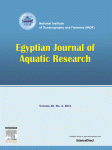
Egyptian Journal of Aquatic Research
Fostering collaboration in the realm of aquatic sciences.Welcome to the Egyptian Journal of Aquatic Research, a premier peer-reviewed academic journal published by ELSEVIER, dedicated to advancing the field of aquatic sciences. With a robust impact factor and recognition as a Q1 journal in key categories such as Aquatic Science and Ecology, this open access journal has established itself as a vital platform for disseminating high-quality research since its inception in 2012. The journal aims to provide comprehensive coverage of topics including ecology, evolutionary biology, and water science, making it a crucial resource for researchers, professionals, and students engaged in these dynamic fields. With Scopus rankings placing it in the top echelons of various categories, the Egyptian Journal of Aquatic Research fosters innovation, collaboration, and knowledge dissemination on a global scale, making it an indispensable asset for anyone invested in understanding and preserving aquatic systems.
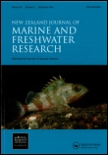
NEW ZEALAND JOURNAL OF MARINE AND FRESHWATER RESEARCH
Championing Ecological Research for Tomorrow's ChallengesNEW ZEALAND JOURNAL OF MARINE AND FRESHWATER RESEARCH, published by Taylor & Francis Ltd, stands as a distinguished platform for the dissemination of innovative research in the realms of aquatic science and ecology. With an ISSN of 0028-8330 and E-ISSN 1175-8805, this journal has been curating significant scientific contributions since its inception in 1967, continuing through to 2024. Recognized in the Q2 category across multiple relevant fields—including Aquatic Science, Ecology, and Water Science—this journal ranks notably in Scopus, with a 74th percentile for Ecology, Evolution, Behavior and Systematics, highlighting its impact and relevance within the scientific community. Though not an open-access publication, its rigorous peer-reviewed articles offer insights that resonate with researchers, professionals, and students who are passionate about advancing our understanding of freshwater and marine ecosystems. By fostering a collaborative space for ecological and environmental inquiries, the NEW ZEALAND JOURNAL OF MARINE AND FRESHWATER RESEARCH is essential for those aiming to contribute to the vital conversations around biodiversity, conservation, and sustainable management of aquatic resources.
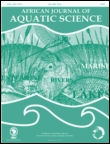
AFRICAN JOURNAL OF AQUATIC SCIENCE
Connecting researchers to the pulse of aquatic ecosystems.AFRICAN JOURNAL OF AQUATIC SCIENCE, published by TAYLOR & FRANCIS LTD, is a premier scholarly journal dedicated to the field of aquatic science, ecology, and environmental management, playing a crucial role in advancing research and knowledge in these vital areas. With an impressive Q2 ranking in both Aquatic Science and Ecology, Evolution, Behavior and Systematics, the journal seeks to publish high-quality research encompassing a wide range of topics related to freshwater and marine ecosystems, including biodiversity, conservation strategies, and the impacts of climate change. Featuring a rich history of publication from 2000 to 2024, the journal not only embraces rigorous peer review but also aims to foster collaboration and dialogue among researchers, practitioners, and students interested in aquatic environments. Readers will find that the journal’s commitment to impactful scientific communication is reflected in its notable rankings within the Scopus database, making it an essential resource for those engaged in aquatic research and management.

Inland Waters
Charting the Course for Aquatic Science ExcellenceInland Waters, published by TAYLOR & FRANCIS LTD, stands as a prestigious scholarly journal dedicated to the critical examination of freshwater ecosystems and their management. With an ISSN of 2044-2041 and an E-ISSN of 2044-205X, this journal boasts a remarkable Q1 ranking in both Aquatic Science and Water Science and Technology for 2023, reflecting its significant impact in the field. Researchers and professionals can benefit from its comprehensive coverage of cutting-edge research, methodological advancements, and policy implications concerning inland waters. Committed to disseminating valuable knowledge in a vital area of environmental science, Inland Waters aims to foster collaboration and promote innovative solutions for sustainable water management practices. As it continues through its converged years from 2012 to 2024, the journal remains an essential resource for those dedicated to advancing our understanding and stewardship of freshwater environments worldwide.
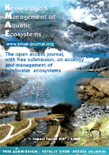
Knowledge and Management of Aquatic Ecosystems
Connecting Ecology and Technology for Aquatic HarmonyKnowledge and Management of Aquatic Ecosystems, published by EDP SCIENCES S A, is a premier open-access journal dedicated to the interdisciplinary study of aquatic ecosystems. With an ISSN of 1961-9502 and an impressive history since 1928, this journal serves as a vital resource for researchers and professionals in the fields of Ecology, Aquatic Science, Water Science and Technology, and Nature Conservation. The journal has consistently achieved high rankings, including a Q2 classification in multiple categories, which underscores its significant contribution to the evolving landscape of aquatic research. With access options that promote widespread dissemination of knowledge, Knowledge and Management of Aquatic Ecosystems aims to bridge gaps in research, policy, and practical applications, making it an invaluable asset for students, researchers, and policymakers aiming for impactful solutions in aquatic management and conservation.
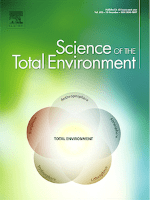
Science of The Total Environment
Connecting Science and Sustainability for a Better TomorrowScience of The Total Environment, an esteemed journal published by Elsevier, holds a significant position in the field of environmental science, encompassing critical areas such as Environmental Chemistry, Environmental Engineering, Pollution, and Waste Management and Disposal. With an impressive impact factor and ranked in the Q1 quartile across its categories for 2023, the journal is recognized for its high-quality research output and contribution to environmental sustainability. Operating from its base in the Netherlands, the journal has been a valuable resource since its inception in 1972, welcoming innovative studies that address complex environmental challenges. Its notable rankings—such as Rank #9 in both Environmental Sciences and Pollution—underscore its relevance and influence in the academic community. Although the journal currently does not provide an open access option, the robust findings and discussions presented within its pages continue to foster a deeper understanding of environmental issues. Science of The Total Environment is an essential platform for researchers, professionals, and students dedicated to advancing knowledge and solutions in the rapidly evolving field of environmental science.

BOLETIM DO INSTITUTO DE PESCA
Connecting researchers for impactful aquatic discoveries.BOLETIM DO INSTITUTO DE PESCA, published by the Instituto Pesca, is a Brazilian journal dedicated to advancing the fields of Animal Science and Aquatic Science. With its Open Access policy adopted in 2008, the journal ensures that research is widely disseminated, fostering collaboration and innovation among researchers, professionals, and students alike. Despite its recent Q4 category rankings in the 2023 metrics for both disciplines, the journal plays a vital role in providing a platform for emerging studies and critical discussions related to aquatic ecosystems and fisheries management. Covering a wide range of topics within its scope, BOLETIM DO INSTITUTO DE PESCA publishes original research, reviews, and case studies, stimulating academic dialogue and contributing to the sustainable management of aquatic resources in Brazil and beyond. This journal is an essential resource for anyone invested in marine and freshwater biology, ecology, and conservation.

LAKE AND RESERVOIR MANAGEMENT
Advancing sustainable solutions for aquatic ecosystems.LAKE AND RESERVOIR MANAGEMENT is a premier academic journal published by Taylor & Francis Inc, providing a dedicated platform for the dissemination of high-quality research and innovations in the field of aquatic management. With an ISSN of 1040-2381 and an E-ISSN of 2151-5530, the journal encompasses a broad spectrum of topics related to the sustainable management and ecological assessment of lakes and reservoirs. As an essential resource for researchers, professionals, and students involved in environmental science, hydrology, and water resource management, the journal aims to address critical issues such as water quality, ecosystem services, and the impact of human activities on aquatic systems. Additionally, the journal promotes interdisciplinary approaches that foster collaborative solutions for effective management of aquatic resources. Although it currently does not offer open access, LAKE AND RESERVOIR MANAGEMENT remains influential in shaping policies and practices within the field, making it a vital read for anyone dedicated to advancing knowledge and practice in aquatic ecosystem management.
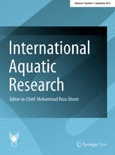
International Aquatic Research
Connecting researchers to the pulse of aquatic ecosystems.International Aquatic Research, published by the Islamic Azad University, Tonekabon Branch, is a vital open-access journal dedicated to advancing the field of aquatic sciences since its inception in 2009. With an ISSN of 2008-4935 and an E-ISSN of 2008-6970, the journal plays a significant role in disseminating high-quality research findings from Iran and around the globe. It covers a broad range of topics in aquatic biology, fisheries science, and marine ecology, making it a valuable resource for researchers, professionals, and students alike. As of 2023, it ranks in the third quartile (Q3) of the aquatic science category with a Scopus rank of #138 out of 247 in Agricultural and Biological Sciences, reflecting its growing influence in the field. With a commitment to promoting scientific knowledge and fostering collaboration among aquatic research communities, International Aquatic Research is positioned as an essential platform for those dedicated to understanding and conserving marine and freshwater environments.